The Top 5 Badass Literary Figures
I wish I could tell you I used something scientific--like a calculator, or some kind of Badassery Abacus--to determine which literary badass was the toughest on the list. I didn't. I don't know how many points killing a guy in a duel is worth as opposed to killing a guy in a war. I just tried to assign a ranking to how I'd react if I were hearing these stories for the first time. For instance, maybe you hear about tough Polish gunrunner and Master Mariner Joseph Conrad and you let out a low whistle of admiration. Then you read about all the ridiculous shit that Ernest Hemingway somehow managed to cram into a single lifetime and you find yourself hiding under your desk, because maybe he's behind you right now. So that gets ranked higher.
The only rule I stuck with is that you had to be an honest-to-God literary figure to get on the list. You couldn't just be some disgraced boxer who wrote a memoir while in jail for breaking someone's spine over a can of Skoal.
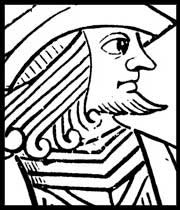
Since this image was chosen at random, it is almost certainly not Thomas Malory. But nobody knows what he looked like, so maybe it looks exactly like him. We can never know for sure.
5.) Sir Thomas Malory
Who Was He? 15th-century English author of Le Morte d'Arthur
But Who Was He Really? A knight, and also inexplicably a bandit, extortionist, and daring jailbreaker
The Badassery: Malory's influential Arthurian epic deals heavily in honor and chivalry, which it's why it's so remarkable that he was apparently a career criminal and professional asshole.
Malory started off his life of ass-kicking by kicking the ass of one Thomas Smith, imprisoning him, and stealing his shit. You might think he'd get in trouble for that, but instead he was elected to the Warwickshire Parliament. This is the first of many incidents demonstrating that nobody, anywhere, ever, could get out of trouble like Sir Thomas Malory.
But not being in trouble just wasn't a life for Malory. He decided that instead of being in the Warwickshire Parliament, he'd rather set an ambush for the Duke of Buckingham, who was a respectable military commander and generally not the type of guy you just decide over breakfast to attack in the woods.

Malory then went on a spree of thievery and extortion, and when people finally got tired of him pillaging the countryside, the aforementioned Duke set out to arrest him. While the Duke was chasing him, Malory raided his lodge and killed his deer. Personally, I'd like to think that he also left a flaming bag of dog poop on the doorstep, because that just seems to be the kind of guy he was.
Admittedly vandalism and deer-killing might not be too badass on their own, but keep in mind that the dude was vandalizing the property of a man who was currently hunting him with a small army. If this irrepressible Ocean's Eleven-esque brand of not-giving-a-shit isn't enough to convince you that Malory was indeed pretty slick, well that's okay, because we haven't even gotten to the impressive stuff yet.
Other than being a dick, Malory's real talent was escaping from trouble (after which he'd invariably just go be a dick somewhere else). When someone finally arrested him in 1451, he immediately broke out of prison and raided an abbey, where he stole money and made fun of the monks. He wound up back in prison, but someone was dumb enough to bail him out, so he started stealing horses and was imprisoned yet again.
Of course, he escaped, this time by fighting his way out, because he's Sir Thomas Malory, Medieval Fucking Superman.
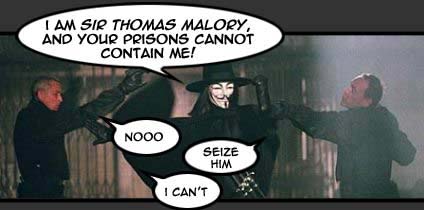
Again, it is almost--but not quite--statistically impossible for this to resemble the historical Sir Thomas Malory. So it may in fact look exactly like Sir Thomas Malory.
He was eventually pardoned, captured again, pardoned, captured again, then died, from which he was not pardoned.
That we know of.
But if anyone manages to escape the bonds of death and run around being a dick, it's going to be him. So if some ghost is killing your cattle and muttering Middle English insults in your ear while you sleep, it's pretty safe to assume assume it's Thomas Malory.

4.) Hunter S. Thompson
Who Was He? Rebellious, drug-fueled maverick who wrote Fear and Loathing in Las Vegas
But Who Was He Really? That, uh, pretty well sums it up
The Badassery: Whether he was shooting at Johnny Depp or threatening to set a cartoonist on fire, Hunter S. Thompson consistently demonstrated that the most basic rules of societal interaction simply did not apply to him. Of course he was a little crazy, but it was a uniquely fearless crazy; instead of the lion tamer kind of badassery, Hunter was more like a guy who'd let a bunch of lions loose in his house because it seems like a good idea at the time. It just wouldn't occur to him to fear his own madness. Then he'd go make a martini.
There's a reason that nobody before Thompson hung out with the Hell's Angels long enough to write a book about them; it's the same reason you wouldn't, say, wrap yourself in steaks and try to interview a bear. If basic human self-preservation doesn't keep you far, far away from a roving gang of murderous bikers, then you're either oblivious or Hunter S. Thompson. If you're oblivious, well, they probably kill you and that's that. If you're Thompson, you invite them into your living room, then threaten them with your shotgun.
Hunter was discharged from the Air Force in 1958 for being a loose cannon. Then he worked for Time magazine and was fired for being a loose cannon. He moved on to a small New York newspaper, who fired him for damaging a candy machine (and for being a loose cannon). Rapidly running out of places where he could be a loose cannon, he went on to ride with the Hell's Angels for a year (after, as previously mentioned, implying he might kill them with a shotgun). In a way, he was fired from that, too, though it took the form of the gang beating the shit out of him and leaving him for dead.
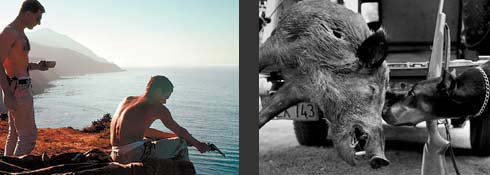
Left: Fishing with guns.
Right: His shot of a dead boar, hunting rifle, and inquisitive Doberman.
If you haven't been keeping score, 100% of these nouns have been badass nouns.
His politics and personality may have made him reprehensible to some, but this is a guy who said he missed the tear gas and the beatings of the '60s, who had absolutely zero regard for trepidation or consequences. If you dropped by his house unexpectedly, he would be as likely to fire his Gatling gun or hurl dynamite at you as offer you a drink.
In the end, after his 2005 suicide, Thompson had potentially the most badass sendoff anyone could wish for; his ashes were fired from a cannon atop a huge tower as red, white, and blue fireworks exploded in the background. The other badass authors are probably rolling in their graves for not having thought of that. Thompson, for his part, will never roll in his grave, because he was fired out of a goddamned cannon. His badassery inhabits the wind.
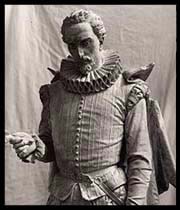
3.) Miguel de Cervantes
Who Was He? 16th-century Spanish author of Don Quixote
But Who Was He Really? Soldier, sailor, and fearless hardass
The Badassery: When Cervantes suddenly ran off to Rome in 1569, it's possible that he was fleeing justice after nearly killing a guy in a duel. It's also possible that he wasn't fleeing anything, and just wanted to pick up a pizza or something. The closer you look at history, the more evident it is that all our narratives are stacked precariously on swaying, rickety towers of bullshit anyway, so does it even matter? The point is that 1.) Cervantes went to Rome and then 2.) he was a badass.
In 1571, after he'd enlisted in the Castilian infantry, Cervantes sailed to battle against the Ottoman Empire. Sick with fever in an age when pretty much every illness was mysterious and likely to kill you, Cervantes fought anyway, saying he preferred to die for God and King than stay below decks. In the ensuing battle he was shot three times--twice in the chest--and had to have his arm amputated. He would later declare that he lost his left arm for the glory of his right, and he no doubt said so with a flourish of his cape and a cavalier bow.
They won the battle, by the way. Probably because the Turks were foolishly wasting their ammunition on unkillable Cervantes.
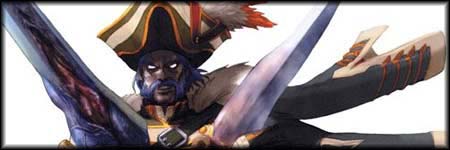
The Soul Calibur series features a fearsome superhuman Spaniard named Cervantes (pictured).
If you think that this is a coincidence, you have not been paying attention.
After a brief hospitalization, Cervantes grew bored of not being shot and went right back into the military. He eventually sailed for Barcelona with a letter of commendation to the king, which (my sources indicate) probably said something along the lines of "Holy frosty balls, Philip II, this guy right here? He is ridiculous. You have to see this guy. Shit. Shit."
If anything could take Cervantes, it was either pirates or ninjas. And since there weren't many ninjas prowling the Mediterranean in those days, it had to be pirates. His ship was attacked by Algerian corsairs, and perhaps a two-armed Cervantes would have fought them off on his own, impaling five men at a time and asking if they "see my point? Hah ha!" while twirling his moustache. Instead, after a fierce battle, Cervantes and the remaining crew were dragged off to slavery in Algiers. He was eventually ransomed, but the episode unfortunately heralded the end of Cervantes' military career.
If this makes you feel sad, don't worry! Thomas Jefferson would later beat up the Algerians in a cool war that nobody ever talks about. The first American ship to defeat one of their vessels was called the USS Enterprise. I realize that if I were just making shit up as I went along, this is exactly what it would sound like, but I am totally not.
Cervantes, for his part, went on to spend a little bit of time in prison--which is practically required of the men on this list--where he started planning what would eventually become Don Quixote. If you've never read Don Quixote, all you really need to know is that it's often called the greatest book ever written, and if someone tells you there was anything funnier written before 1605, he is either a liar or a man with a very inaccurate calendar. (And don't you dare go "DURR BUT WHAT ABOUT CHAUCER LOL??" Chaucer is not funny. Chaucer is terrible.)
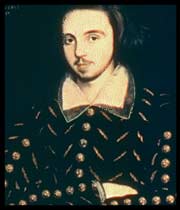
If you're wondering why he has kind of silly facial hair, it's because he accomplished more before he was able to grow facial hair than the rest of us will in our entire lives.
2.) Christopher Marlowe
Who Was He? 16th-century English playwright who wrote about dynamic antiheroes who reject society
But Who Was He Really? A dynamic antihero who rejected society
The Badassery: Marlowe was such a mysterious rogue that actual facts were unable to contain his awesomeness, so people just started flat-out making shit up, and it's hard to extricate the man's actual life from his ridiculous legend. For instance, he was suspected of involvement in two murders--he spent a little bit of time in prison for one of them--but was never convicted. Frankly, even if everything we know about him is fiction, you still have to be a badass to begin with when contemporary legend paints you as a bar-brawling duelist with magic powers.
What we do know is this: Cambridge almost didn't award Marlowe his master's in 1587 because of a rumor that he'd converted to Catholicism. Soon, though, they received a curious official letter that basically told them to shut up, give him the degree, and stop asking so many goddamned questions. This letter references the Queen twice. A popular theory is that when he wasn't writing masterpieces good enough for Swinburne to call him "the most daring and inspired pioneer in all our poetic literature," Marlowe was working as a spy for the Crown.
Is there any scholarly truth to this theory, or is it just another brightly-colored facet of the unsolvable Marlowe Legend Rubik's Cube? I conducted an exclusive interview with an expert* on Christopher Marlowe** to find out.
*The expert is myself**I took two classes that briefly addressed Marlowe five years ago

At this stage in the interview I began to grow deeply concerned with the things I was learning about myself, so I wrapped things up very abruptly.
Ultimately, Marlowe was too much of an iconoclastic bastard to last long. Rumors of atheism and indiscriminate sexuality dogged him his whole career, and he was frequently in trouble with the law. He was arrested for counterfeiting coins in 1592, but was never charged; then, apparently in an effort to do the most stupidly ballsy thing he could think of, he went on to make a bunch of deeply disparaging remarks about Jesus and was arrested for that in 1593. Only a few days later he was killed in a knife fight, surrounded by shady underworld types, possibly assassinated. And "assassinated via knife fight" is almost certainly the coolest death you could ask for in Elizabethan England.
Incidentally, if you think this whole thing is beginning to sound too much like some embellished historical graphic novel, here's another one for you: Marlowe belonged to a secretive organization known as the School of Night, and once worked for a man named Lord Strange.
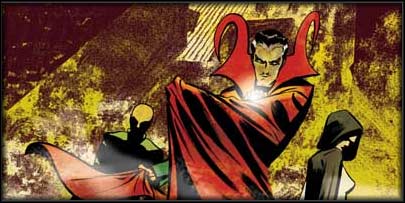
In my imagination, this man taught Marlowe the arts of mysticism and intrigue.
Here's a good way to look at the life of Christopher Marlowe: when he died, he'd been out of college for six years. He was 29. In that time, regardless of whether or not he was authoritatively a spy who killed a man, he had been a mysterious government agent and local legend who authored some of the greatest plays ever written in the English language. He did all of this, and died a dramatic death, before he was 30. The details of his life will be debated long after you and I die of old age. Marlowe makes young Orson Welles look like a lazy sack of garbage.
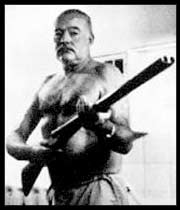
1.) Ernest Hemingway
Who Was He? Pulitzer- and Nobel Prize-winning American author of novels and short fiction
But Who Was He Really? Boxer, hunter, weapons instructor, bullfighting enthusiast, and all-around icon of manliness
The Badassery: Christ. Where to begin.
When Tyler Durden mentions Hemingway as the guy he'd most like to fight in Fight Club, he is not fucking around. There is a good reason for this. That reason is that Hemingway is more of a comic book character or an action hero than a believable human being.
After high school, where he boxed and played football, Hemingway went to WWI in the Red Cross ambulance corps. There he dragged an Italian soldier to safety despite being hit by mortar shrapnel and machine gun fire, for which he received the Silver Medal for Military Valor (presumably the gold one is reserved for being hit by two mortars, as well as piranhas).
As soon as another war started--the Spanish Civil War, this time--Hemingway bounded off to that one. Supposedly he was there as a journalist, but knowing Hemingway, he may well have been an informant and instructor for Republican forces, teaching them to eat bullets and shit fury.
When WWII came along, Hemingway hung around on a ship dedicated to sinking German submarines. Later, on land, he came across a basement full of S.S. troops in France, whom he told to "share these among yourselves" before tossing a bunch of grenades inside (the French just assumed he was a military officer, because he was killing too many Nazis not to be, so the local mayor gave him some champagne). Until recently, biographers figured that all of this submarine-sinking and Nazi-exploding must have kept Hemingway pretty busy on their own, but now it turns out that in his free time he was running his own intelligence network to spy on Nazi sympathizers in Cuba.
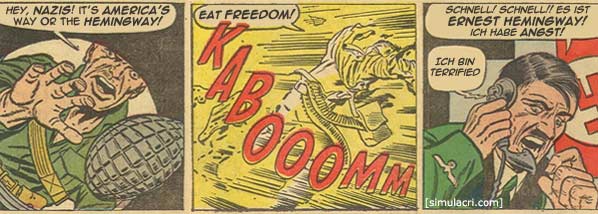
Artist's rendition of Hemingway's WWII exploits (not pictured, and not appropriate: realism)
The problem with writing about Hemingway's badassery isn't finding material; it's deciding what to cut. There's just too much. Listing it all would just make regular people feel bad. The badassery just saturated his entire life.
Badass Quote: Hemingway once said to Ezra Pound that bulls are better than literary critics because you can eat them after you kill them. Anything I add would just subtract from the machismo of that quote, because compared to Ernest Hemingway, I am a simpering little schoolgirl in a flower-print blouse.
Badass Writing Style: Adjectives are for pussies. Long, descriptive sentences are like long, descriptive penises: they have no place in Hemingway's prose. Hemingway writes what fucking happens. There is no time for anything else.
Badass Anecdote: Hemingway once refereed a boxing match wherein the losing boxer's trainer--a boxer named Shine Forbes--tried repeatedly to throw in the towel, but Hemingway, apparently disgusted by the notion of a man unwilling to die on his feet, kept throwing it back.
Enraged, Forbes leaped into the ring and punched Hemingway in the chest, evidently unaware that he was punching a man mortars couldn't fell. Hemingway shrugged it off, lifted Forbes by the ears, and shook him like a child. When the police showed up to arrest Forbes, Hemingway told them not to, because anyone with enough balls to take a swing at him was okay by Hemingway.
Please just pause for a minute to reflect on how awesome that is.
Again and again, the world tried to kill Hemingway. Over the course of his life, Hemingway survived the following: the aforementioned mortar/machine gun combo, which shot off his kneecap and riddled him with shrapnel (medics assumed he would certainly die); gunshots to both feet, both hands, both knees, and both arms; a ridiculous number of head wounds and concussions (Hemingway was uncertain how many); six broken ribs; three car crashes and two plane crashes; two fires; a crushed vertebra; paralysis; numerous ruptured organs; and a goddamned anthrax infection.
Life tried so hard and so repeatedly to kill Hemingway that numerous newspapers prematurely featured his obituary; these newspapers clearly didn't realize that the only thing capable of killing Ernest Hemingway was Ernest fucking Hemingway. And when he finally did so, he famously used both barrels of the shotgun, the final act of a man who obviously appreciated that one barrel alone would not be able to stop him.
Since suicide is a rather depressing note on which to end this article, I'll leave you with this: in Heaven, he's probably sitting on the comfiest couch, watching the sweetest TV, because nobody up there would dare tell him to move or ask him to turn off the 24-Hour Bullfighting Channel. So he's sitting there, smoking a huge, terrible cigar and ashing on a portrait of Franco, eternally undisturbed. Archangels speak softly around Ernest Hemingway.

